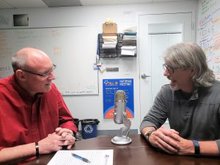Found 11 resources.
0
0
0
Developed by listening to our community, the Alliance has compiled seven hallmarks that make up a person-first health system.
Topics: Advocacy, Community development, Health, Healthy homes, Medicaid / Medicare
 Shared by Molli Caite Hughes
on Dec 6, 2023
Shared by Molli Caite Hughes
on Dec 6, 2023 0
0
0

On a day-to-day basis, vulnerable populations suffer from inequities in health, wealth, and education. These same people are then disproportionately impacted by catastrophes ranging from hurricanes to COVID-19, which only serve to underline the great and urgent need for equity across race, gender, and income. In the latest episode of The Intersect, Madeline Colety and Lorine Giangola discuss how Abt’s housing and resilience work is helping clients promote equity.
Topics: Advocacy, Community development, Education, Food insecurity, Health, Healthy homes, Homelessness, Housing, Low-income, Partnerships, Racial inequalities
 Shared by Housing Is
on Jan 14, 2021
Shared by Housing Is
on Jan 14, 2021 0
0
0

Trends in Housing Assistance and Who it Serves
Topics: Community development, Disabilities, Education, Funding, Health, Homelessness, Housing, Legislation & Policy, Low-income, Partnerships, Research, Seniors, Workforce development, Youth
 Shared by Keely Stater
on Sep 10, 2019
Shared by Keely Stater
on Sep 10, 2019 0
0
0
This environmental scan, conducted by AcademyHealth with support from the Kresge Foundation, provides an overview of the technology behind emerging multi-sector initiatives to address social determinants of health.
Topics: Community development, Data sharing, Health, Partnerships, Research
 Shared by Housing Is
on May 2, 2019
Shared by Housing Is
on May 2, 2019 0
0
0
While the program has changed very little since its inception, the need for the program has increased. In 1975, the number of program grantees stood at 594. Today, the number of grantees stands at 1,268 as more communities qualify to receive direct program allocations. Based on a CDBG Needs Survey conducted by the CDBG Coalition (and discussed later in this report), CDBG grantees have delayed and canceled projects and reduced or permanently eliminated programs because of a lack of CDBG funds. CDBG is an important investment tool for communities and neighborhoods, but program funding must...
Topics: Community development, Funding, Health, Homelessness, Housing, Legislation & Policy, Low-income, Partnerships, Research, Safety, Seniors
 Shared by Housing Is
on Apr 8, 2019
Shared by Housing Is
on Apr 8, 2019 0
0
0

Asset-based community development (ABCD) is a large and growing movement that considers local assets as the primary building blocks of community development, social capital, and health and well-being. Ron Dwyer-Voss, MA, the Owner of Pacific Community Solutions, who also happens to be a long-time friend of podcast host Peter Eckart, joined the show to discuss how ABCD draws on existing strengths of local residents, associations, and institutions to build stronger, healthier, and more sustainable communities. He shared strategies, tools, and examples of how ABCD can be used to engage community...
Topics: Asset building, Community development, Health, Partnerships
 Shared by Housing Is
on Mar 19, 2019
Shared by Housing Is
on Mar 19, 2019 0
0
0
These Principles are derived from a thematic review of mission statements and principles from 35 organizations representing the community development, health, academic, government, finance, and philanthropic sectors. More than 200 respondents provided over 1,800 comments which helped refine the Principles below.
Topics: Community development, Health, Housing, Partnerships, Racial inequalities
 Shared by Housing Is
on Mar 11, 2019
Shared by Housing Is
on Mar 11, 2019 0
0
0
Leah Hendey, MPP, Senior Research Associate at the Urban Institute, joined the podcast to reflect on her experiences co-directing the National Neighborhood Indicators Partnership (NNIP), a nationwide effort to advance the use of neighborhood-level data to drive local decision-making. NNIP is led by the Urban Institute and a network of 32 partners representing local data intermediaries across the country. Hendey discussed the role local data intermediaries play in their communities, explained how neighborhood-level data can be used to understand and address issues of health equity, and shared...
Topics: Community development, Data sharing, Health, Partnerships, Place-based
0
0
0
Why does it seem as if poverty is segregated to certain neighborhoods? What’s the secret to addressing the root of intergenerational poverty? How can we bring in new investment while preserving the history and culture of a place? Join us to explore these questions and more.
Topics: Community development, Education, Health, Housing, Low-income, Mobility, Place-based, Racial inequalities, Research
0
0
0
CLPHA’s Housing Is Initiative is engaged in a number of cross-sector activities focused on developing partnerships, facilitating a community of practice, resource development, promoting best practices, online collaboration, policy and advocacy, and training and education. Read about recent activities in this Fall Update.
Topics: Child welfare, CLPHA, Community development, Cost effectiveness, Data sharing, Early childhood, Education, Family engagement, Funding, Health, Homelessness, Housing, Low-income, Medicaid / Medicare, Mental health, Partnerships, Place-based, Post-secondary, Research, Stability, Substance abuse, Workforce development, Youth
0
0
0

Why do some neighborhoods appear able to launch effective local improvement initiatives, while others are more hampered by fragmentation and mistrust? Why can some communities mobilize diverse constituencies to influence public policy, while others cannot? Answers to these questions may be found in the specific patterns of collaboration that form among community organizations, and between these groups, schools, public agencies, and elected officials, according to MDRC, a preeminent social-policy research organization.
Topics: Asset building, Child welfare, Community development, Data sharing, Dual-generation, Education, Family engagement, Funding, Health, Housing, Legislation & Policy, Low-income, Metrics, Midwest, Mobility, Out-of-school time, Partnerships, Place-based, Preventative care, Research, Safety, Stability, Workforce development, Youth


